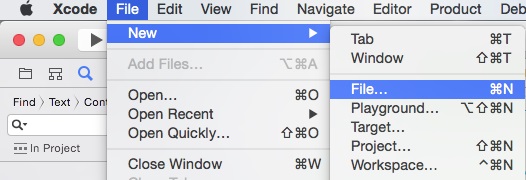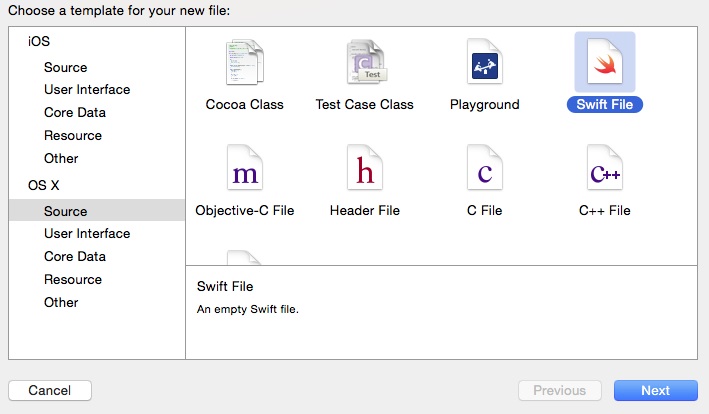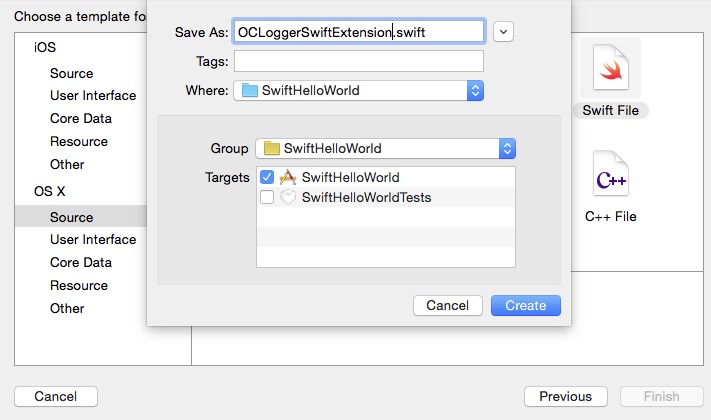For up-to-date product documentation, see the IBM MobileFirst Foundation Developer Center.
Using Logger in Swift projects
In order to use OCLogger in Swift projects, we can configure your Swift application by following the steps described in this section.
Procedure
- Create a native MobileFirst application for iOS that uses Swift. For more information, see Develop native applications for iOS in Xcode.
- In the Xcode IDE, create a Swift file and name it OCLoggerSwiftExtension.swift.
Figure 1. New Xcode File

Figure 2. Swift File Type

Figure 3. Name a Swift File

- Add the following code to the file:
import Foundation extension OCLogger { //Log methods with no metadata func logTraceWithMessages(message:String, _ args: CVarArgType...) { logWithLevel(OCLogger_TRACE, message: message, args:getVaList(args), userInfo:Dictionary<String, String>()) } func logDebugWithMessages(message:String, _ args: CVarArgType...) { logWithLevel(OCLogger_DEBUG, message: message, args:getVaList(args), userInfo:Dictionary<String, String>()) } func logInfoWithMessages(message:String, _ args: CVarArgType...) { logWithLevel(OCLogger_INFO, message: message, args:getVaList(args), userInfo:Dictionary<String, String>()) } func logWarnWithMessages(message:String, _ args: CVarArgType...) { logWithLevel(OCLogger_WARN, message: message, args:getVaList(args), userInfo:Dictionary<String, String>()) } func logErrorWithMessages(message:String, _ args: CVarArgType...) { logWithLevel(OCLogger_ERROR, message: message, args:getVaList(args), userInfo:Dictionary<String, String>()) } func logFatalWithMessages(message:String, _ args: CVarArgType...) { logWithLevel(OCLogger_FATAL, message: message, args:getVaList(args), userInfo:Dictionary<String, String>()) } func logAnalyticsWithMessages(message:String, _ args: CVarArgType...) { logWithLevel(OCLogger_ANALYTICS, message: message, args:getVaList(args), userInfo:Dictionary<String, String>()) } //Log methods with metadata func logTraceWithUserInfo(userInfo:Dictionary<String, String>, message:String, _ args: CVarArgType...) { logWithLevel(OCLogger_TRACE, message: message, args:getVaList(args), userInfo:userInfo) } func logDebugWithUserInfo(userInfo:Dictionary<String, String>, message:String, _ args: CVarArgType...) { logWithLevel(OCLogger_DEBUG, message: message, args:getVaList(args), userInfo:userInfo) } func logInfoWithUserInfo(userInfo:Dictionary<String, String>, message:String, _ args: CVarArgType...) { logWithLevel(OCLogger_INFO, message: message, args:getVaList(args), userInfo:userInfo) } func logWarnWithUserInfo(userInfo:Dictionary<String, String>, message:String, _ args: CVarArgType...) { logWithLevel(OCLogger_WARN, message: message, args:getVaList(args), userInfo:userInfo) } func logErrorWithUserInfo(userInfo:Dictionary<String, String>, message:String, _ args: CVarArgType...) { logWithLevel(OCLogger_ERROR, message: message, args:getVaList(args), userInfo:userInfo) } func logFatalWithUserInfo(userInfo:Dictionary<String, String>, message:String, _ args: CVarArgType...) { logWithLevel(OCLogger_FATAL, message: message, args:getVaList(args), userInfo:userInfo) } func logAnalyticsWithUserInfo(userInfo:Dictionary<String, String>, message:String, _ args: CVarArgType...) { logWithLevel(OCLogger_ANALYTICS, message: message, args:getVaList(args), userInfo:userInfo) } } - Test that the Swift extension is working by using the Logger
in Swift with the following code:
OCLogger.setLevel(OCLogger_TRACE) OCLogger.setCapture(true); let logger : OCLogger = OCLogger.getInstanceWithPackage("MyTestLoggerPackage") logger.logTraceWithMessages("Hello %@", "Trace"); logger.logTraceWithMessages("Hello Trace"); OCLoggerDebug("Hello Debug!"); OCLoggerDebug("Hello %@", package: "SomePackageName", args: "Debug!");
Results
Verify the output is similar to the following output:SwiftHelloWorld[7591:4265124] [TRACE] [MyTestLoggerPackage] Hello Trace SwiftHelloWorld[7591:4265124] [TRACE] [MyTestLoggerPackage] Hello Trace SwiftHelloWorld[7591:4265124] [DEBUG] [IMF] viewDidLoad() in ViewController.swift:26 :: Hello Debug! SwiftHelloWorld[7591:4265124] [DEBUG] [SomePackageName] viewDidLoad() in ViewController.swift:27 :: Hello Debug!
Note: The project name used in this example is SwiftHelloWorld. Your project name will show in the output in place of SwiftHelloWorld. The code was added to the viewDidLoad() function in the ViewController.swift file. Your output depends on where you added the code in your project. The timestamps were removed from this example for clarity.
Parent topic: Develop native applications for iOS in Xcode